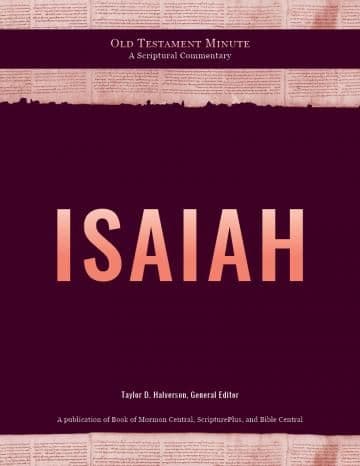Book
66 Chapters

Isaiah 6
Isaiah’s grand vision of the Lord probably took place in or around 740 BC, near the beginning of his ministry. The Lord here is none other than Jesus Christ (2 Nephi 11:2–3; John 12:41), and the temple is the Temple in Heaven, which is the celestial temple. Isaiah saw Jesus Christ sitting on His exalted throne, in the Temple’s throne room (for descriptions of the throne room, see Ezekiel 1:26; Revelation 4:2–4; Doctrine and Covenants 137:3), which is the holy of holies. Isaiah relates the vision in the first person, using the pronouns I and me. Joseph Smith instructs us that Isaiah’s vision was connected with Isaiah receiving the gift of the Second Comforter (Teachings, 150–151).
high and lifted up. God’s throne is exalted. hems of His robe filled the Temple. God’s temple robes—His priesthood power and purity filled the temple.
seraphs. The seraphs are a class of angels that are located in the celestial kingdom. Based on the Hebrew root saraph (“to burn”), the term seraph may be translated “burning one” or “bright shining one,” referring to the seraphs’ glorious condition and location near the Lord’s throne. In a revelation, Joseph Smith described the “bright, shining seraphs around [God’s] throne” who shout “acclamations of praise, singing Hosanna to God and the Lamb!” (Doctrine and Covenants 109:79), some of whom are premortal spirits (Doctrine and Covenants 38:1). The seraphs’ wings are likely not literal; rather, they are a “representation of power, to move, to act, etc.” (Doctrine and Covenants 77:4).
Lord of Hosts. Generally refers to the Lord’s hosts of angels. holy, holy, holy. Compare the four living beings in Revelation, who say, “Holy, holy, holy, Lord God Almighty” (Revelation 4:8). posts of the thresholds shook. The power of the seraphs’ voices shakes the posts. house was filled with smoke. Smoke sometimes symbolizes God’s glory (Exodus 19:8; Revelation 15:8).
unclean lips. The Hebrew word twice translated “unclean” (tame’) in these two lines refers to ceremonial or ritual uncleanness (as per the lexicons). To remove Isaiah’s uncleanness, a seraph took a coal from the sacrificial altar and touched Isaiah’s lips, saying, “Behold, this has touched your lips, and your iniquity is removed and your sin atoned,” thus removing his iniquity.
The expressions “Whom will I send?” and “Here am I; send me” (see 6:8) follow an ancient, sacred pattern; Abraham 3:27 states, “And the Lord said: Whom shall I send? And one answered like unto the Son of Man: Here am I, send me.”
Jesus cited Isaiah’s prophecy “Make the heart of this people fat” and so on (see Matthew 13:14–15).
Using anatomical parts, the Lord speaks chiastically—heart, ears, eyes/ /eyes, ears, and heart. The prophecy finds partial fulfillment in Jesus’s day (Matthew 13:13–15; John 12:37–41; Acts 28:25–28); the words also pertain to everyone who is spiritually blind and hardhearted.
Isaiah asks the Lord how long would people choose spiritual blindness; He responds, until cities and houses are “ruined without inhabitant” and the land is entirely destroyed.
The Hebrew in this verse poses difficulties, making it challenging to translate.
Book
66 Chapters
Items in the BMC Archive are made publicly available for non-commercial, private use. Inclusion within the BMC Archive does not imply endorsement. Items do not represent the official views of The Church of Jesus Christ of Latter-day Saints or of Book of Mormon Central.